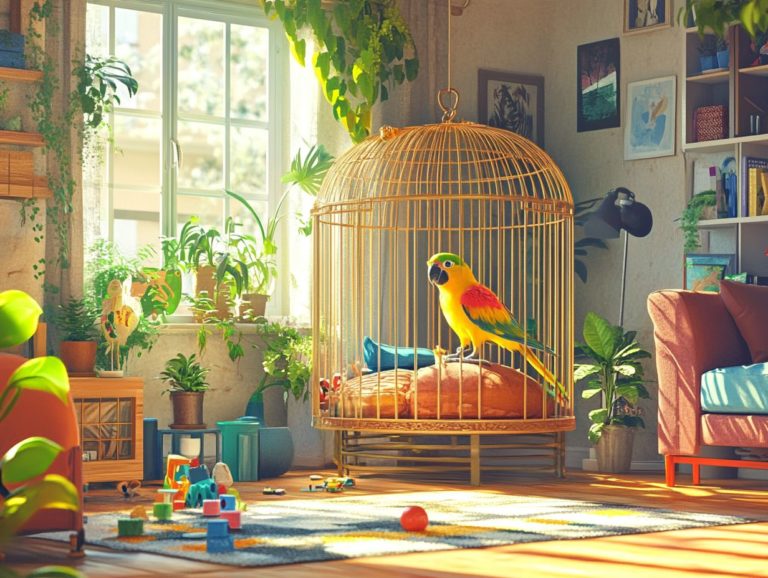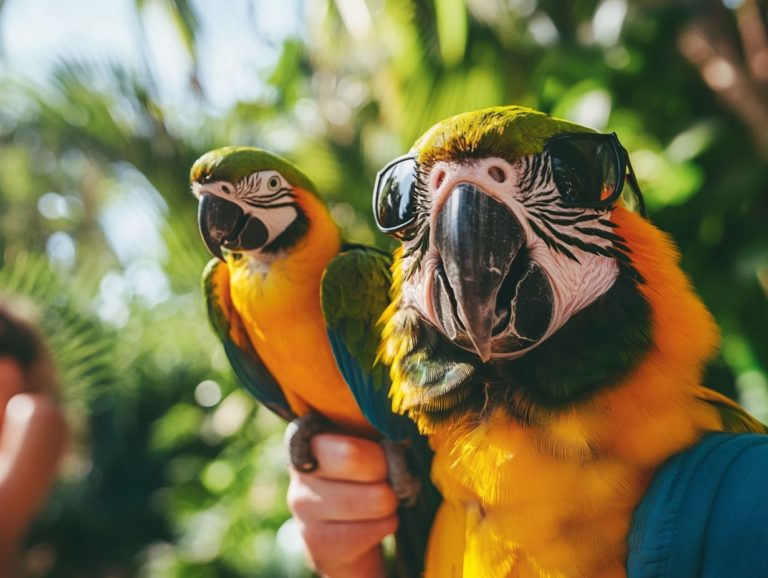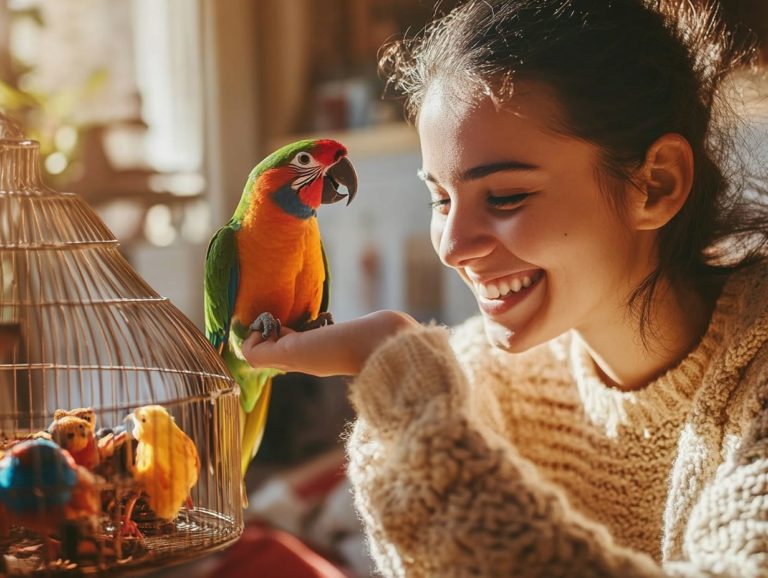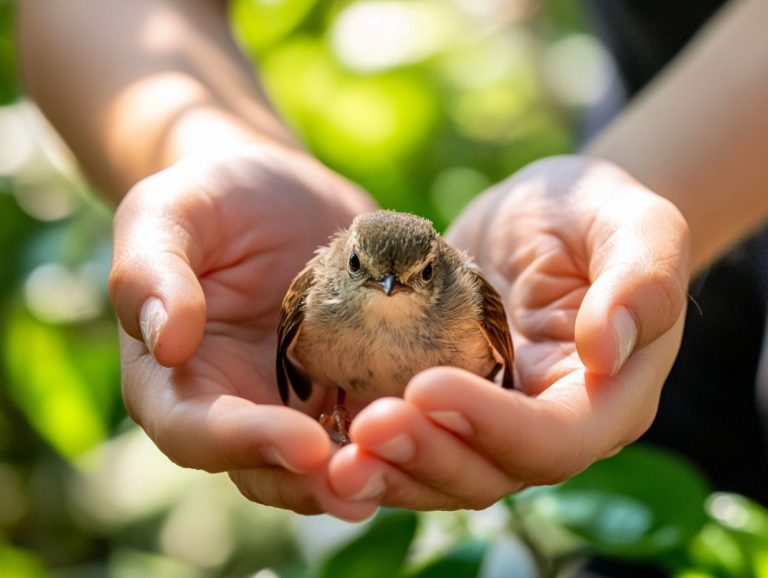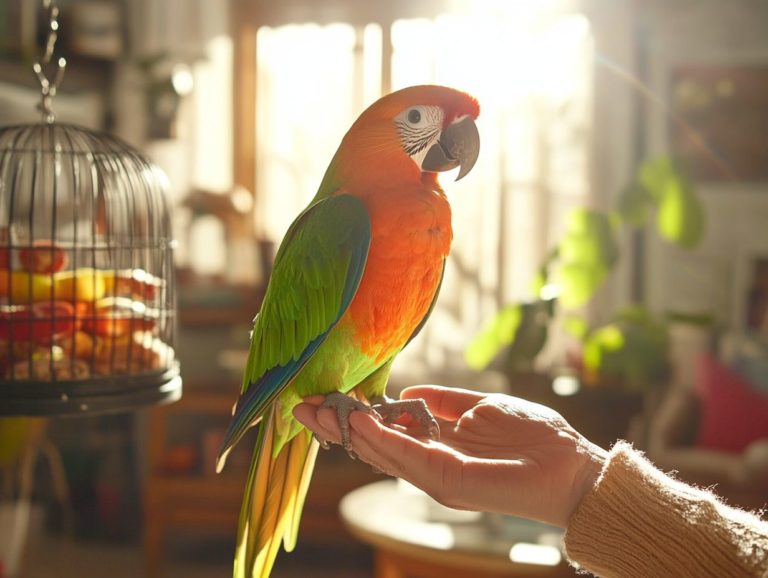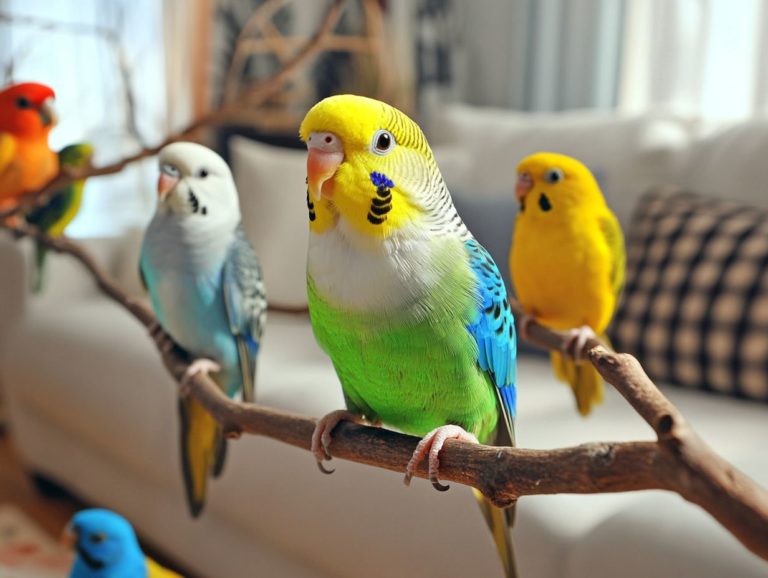How to Prepare Your Home for a New Bird
Considering adding a feathered friend to your family? Owning a pet bird can infuse joy, companionship, and a delightful charm into your home.
Approaching this commitment requires thoughtful consideration. From selecting the right type of bird to crafting a safe and inviting environment, there are numerous factors to ponder.
This guide will assist you in preparing your home, welcoming your new pet, and nurturing a lasting bond while also addressing any potential challenges along the way.
Dive in to uncover everything you need to ensure a joyous life with your new avian companion!
Contents
- Key Takeaways:
- Choosing the Right Type of Bird
- Preparing Your Home for a Bird
- Introducing Your Bird to Your Home
- Best Practices for a Smooth Transition
- Creating a Bond with Your Bird
- Potential Challenges and Solutions
- Frequently Asked Questions
- What are the basic steps to prepare my home for a new bird?
- What type of cage should I get for my new bird?
- Why is it important to have a designated area for my new bird?
- How can I ensure my home is safe for my new bird?
- What items should I provide for my new bird’s well-being?
- Do I need to make any changes to my home for a new bird?
Key Takeaways:
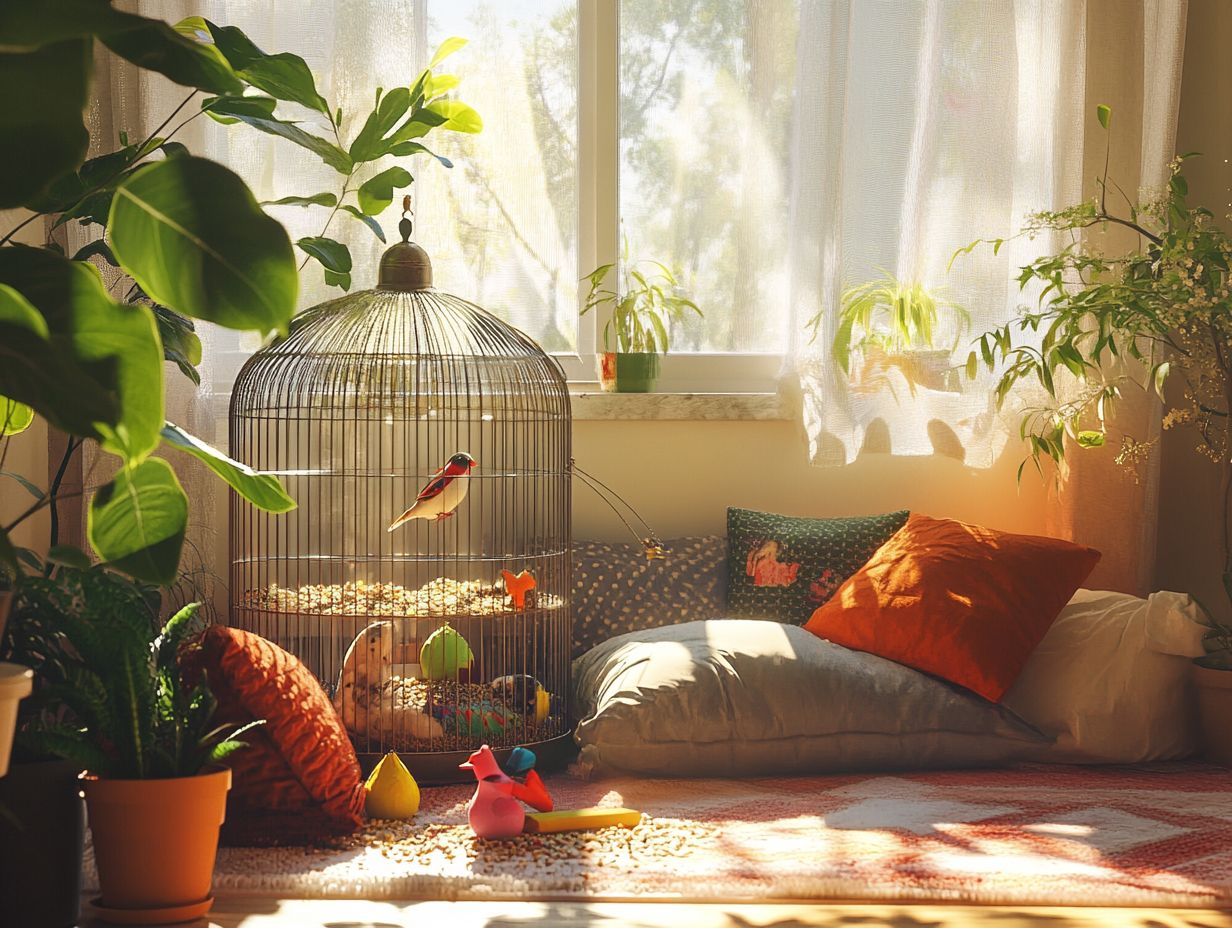
- Choose the right type of bird for your lifestyle and living space.
- Create a safe and engaging environment with the right supplies.
- Gradually introduce your bird to your home to build trust.
Why You Should Own a Bird
Owning a pet bird can bring a wealth of benefits that enrich your life and elevate your everyday experiences. Social species like cockatoos, African grays, and Amazons can provide companionship, spark social interactions, and can even be trained to engage meaningfully with you and your family.
The sounds they create can fill your home with a lively atmosphere, while their unique personalities add an enchanting dynamic to your daily routine. When you acclimate your bird in a safe and comfortable environment, you foster trust, ensuring a rewarding companionship.
Beyond their charming vocalizations and playful antics, the joyful presence of feathered friends can significantly enhance family life. Their social needs encourage bonding moments, whether through playful games or shared mealtimes that promote healthy diets rich in seeds, fruits, and vegetables.
Regular playtime is essential. Providing stimulating toys and activities is key to supporting their mental well-being. By creating a bird-friendly environment with spacious cages and safe perches, you not only meet their needs but also maximize the joy they can bring into your home. Creating this bond will bring joy and excitement to your life!
Choosing the Right Type of Bird
Choosing the right type of bird is essential for building a strong and happy relationship with your new feathered companion. Each species be it cockatoos, African greys, or Amazons comes with its own unique personality, social needs, and care requirements.
This makes it crucial for prospective bird owners to reflect on their preferences and lifestyle prior to making a selection. Considerations such as your living space, the time you can dedicate to interaction, and your familiarity with bird care will significantly impact the compatibility between your chosen bird and your household.
Factors to Consider
When selecting the right type of bird, there are several critical factors to ensure a successful and enriching ownership experience.
- Evaluate the bird’s habitat requirements, including the type of enclosure and the necessary safety features to protect your feathered companion.
- Understand the bird’s dietary needs, including a well-balanced mix of pellets, fruits, and vegetables for its health and happiness.
- Train your bird to acclimate to its new surroundings to build trust and integrate it into your family.
- Recognize that different bird species have specific environmental needs; some thrive in warmer climates, while others prefer cooler settings.
- Provide enrichment through toys and social interaction to enhance mental stimulation and support well-being.
- Don’t overlook safety precautions, such as avoiding exposure to toxic plants and hazardous materials.
- Establish a routine for regular vet check-ups to catch potential health issues early on, ensuring your bird remains a joyful and vibrant member of your household.
Get ready to welcome your new feathered friend today! Join the vibrant world of bird ownership and watch your life take flight!
Preparing Your Home for a Bird
Preparing your home for a bird involves thoughtful consideration to establish an environment that prioritizes the safety and comfort of your new companion. For more details on this process, check out our guide on how to prepare for a new bird arrival.
Choose a spacious cage that accommodates your bird’s natural behaviors and preferences. Position it in a quiet room away from drafts and direct sunlight. Include toys that meet your bird s needs for mental stimulation and physical activity, alongside safe textures and engaging colors.
It’s essential to ensure that your home is bird-proof to prevent accidents and create a secure haven for your feathered friend. For more detailed guidance, check out this guide on setting up the perfect bird aviary.
Creating a Safe Environment
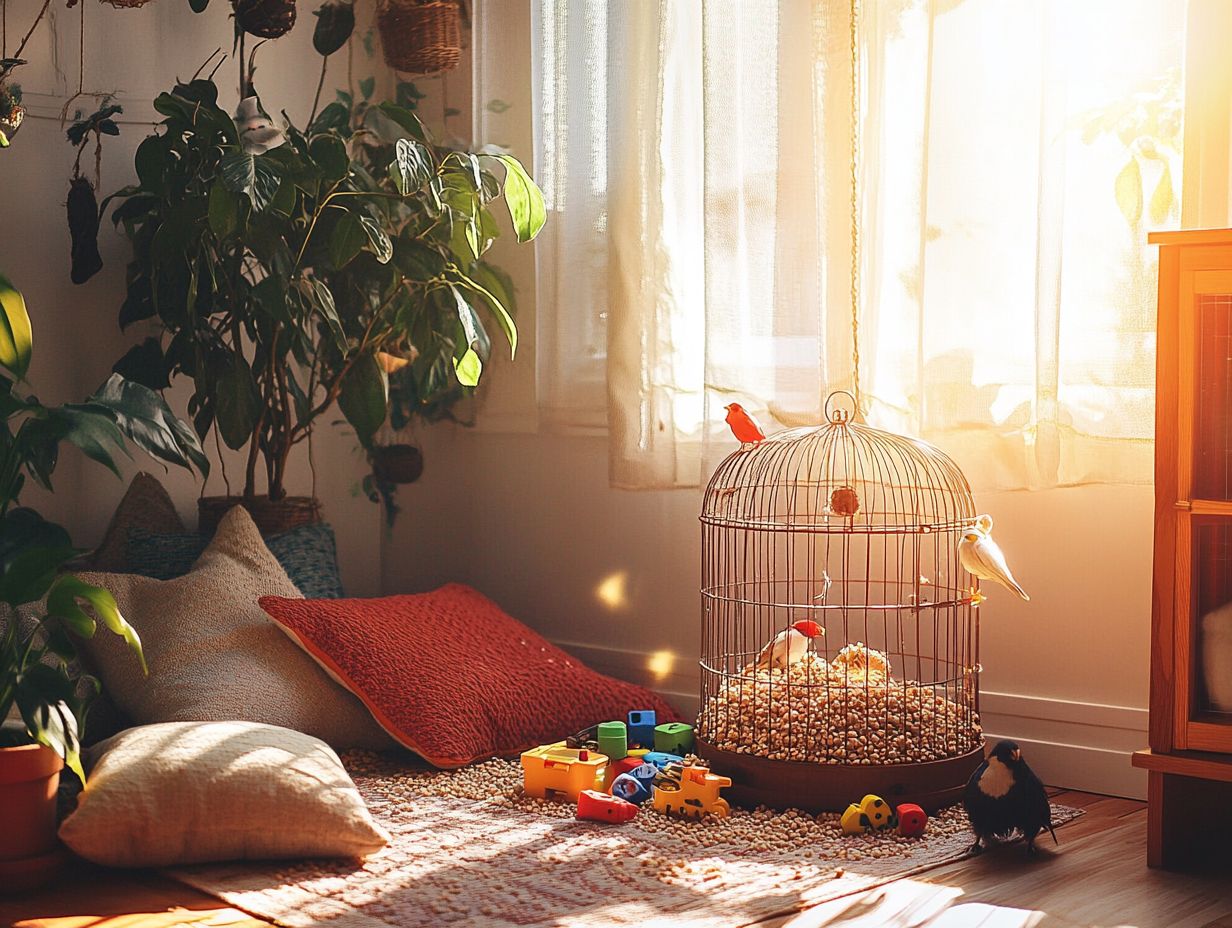
Creating a safe haven for your bird is crucial for its overall well-being and happiness. Birds are sensitive souls, easily stressed by unfamiliar sounds and chaotic environments. That’s why it’s essential to carve out a quiet space away from noise and disturbances.
This sanctuary should be devoid of any potential dangers. This allows your feathered friend to feel at ease as it explores its surroundings. Begin by surveying your space and identifying common hazards that could pose risks things like curtains that might entangle or small items that could be swallowed.
Once you ve pinpointed these risks, you can take essential safety measures, such as:
- Securing loose items
- Covering windows with bird-safe screens
- Using cord protectors for any exposed wires
Enhancing the area with safe toys and perches will keep your bird mentally engaged. It also reinforces a calm, secure environment tailored specifically to its needs.
Essential Supplies and Equipment
Equipping your home with essential supplies and equipment is crucial for delivering exceptional care to your pet bird. Start by selecting a suitable bird cage tailored to your bird’s species one that offers ample space and is outfitted with perches, food and water bowls, and engaging toys for playtime.
A balanced diet is vital for your bird’s health. Consider a mix of a pelleted diet along with fresh fruits and vegetables. Consulting with an avian vet can provide you with expert guidance on the best dietary choices.
Training tools, like clickers, can help you establish routines and enhance the bond between you and your feathered friend.
Grasping the significance of enrichment is fundamental to your bird’s overall well-being. Enrichment refers to activities and toys that keep your bird mentally stimulated and happy. Providing a variety of toys think puzzles and shreddable items encourages natural behaviors and mental stimulation, which are essential for their happiness.
Regular opportunities for social interaction not only deepen the connection between you and your bird but also greatly contribute to its emotional health.
Don t overlook the importance of investing in proper grooming tools, such as nail clippers and bathing options; they play a pivotal role in your bird’s maintenance and comfort. Prioritizing these essentials helps create a thriving environment for your avian companion.
Introducing Your Bird to Your Home
Introducing your bird to its new home is a pivotal step that demands both patience and meticulous planning to ensure your feathered friend acclimates effectively. During this time, learning how to socialize your new bird is essential for cultivating trust and helping your bird feel secure and comfortable in its new environment.
Allow your bird the time it needs to explore its surroundings. This will assist in familiarizing it with the new sounds and sights. Gradually increasing interactions with family members can also aid in this process.
Establishing a routine during this period will further enhance your bird’s sense of security. This makes the adjustment smoother for everyone involved.
Best Practices for a Smooth Transition
Implementing best practices can help your bird adapt to its new home. Start by placing the cage in a quiet corner so it feels secure, and consider these tips for bird care in small apartments to create a comfortable environment.
Introduce your bird gradually to family members. Use gentle interactions to build trust.
Minimize loud noises and sudden movements in the initial days. This allows your bird to explore its new space at its own pace.
Using treats during introductions can enhance bonding. Establish a consistent routine for feeding and care.
Reinforce desired behaviors through training. This not only strengthens your connection but also boosts your bird’s confidence.
Creating a Bond with Your Bird
Building a bond with your bird is rewarding. It requires time, patience, and consistent engagement.
Establishing trust is essential for a strong relationship. Achieve this through regular training, gentle handling, and positive reinforcement.
Social species, such as cockatoos and African grays, thrive on interaction. You can foster a secure environment by incorporating playtime into your daily routine.
Building Trust and Establishing a Routine
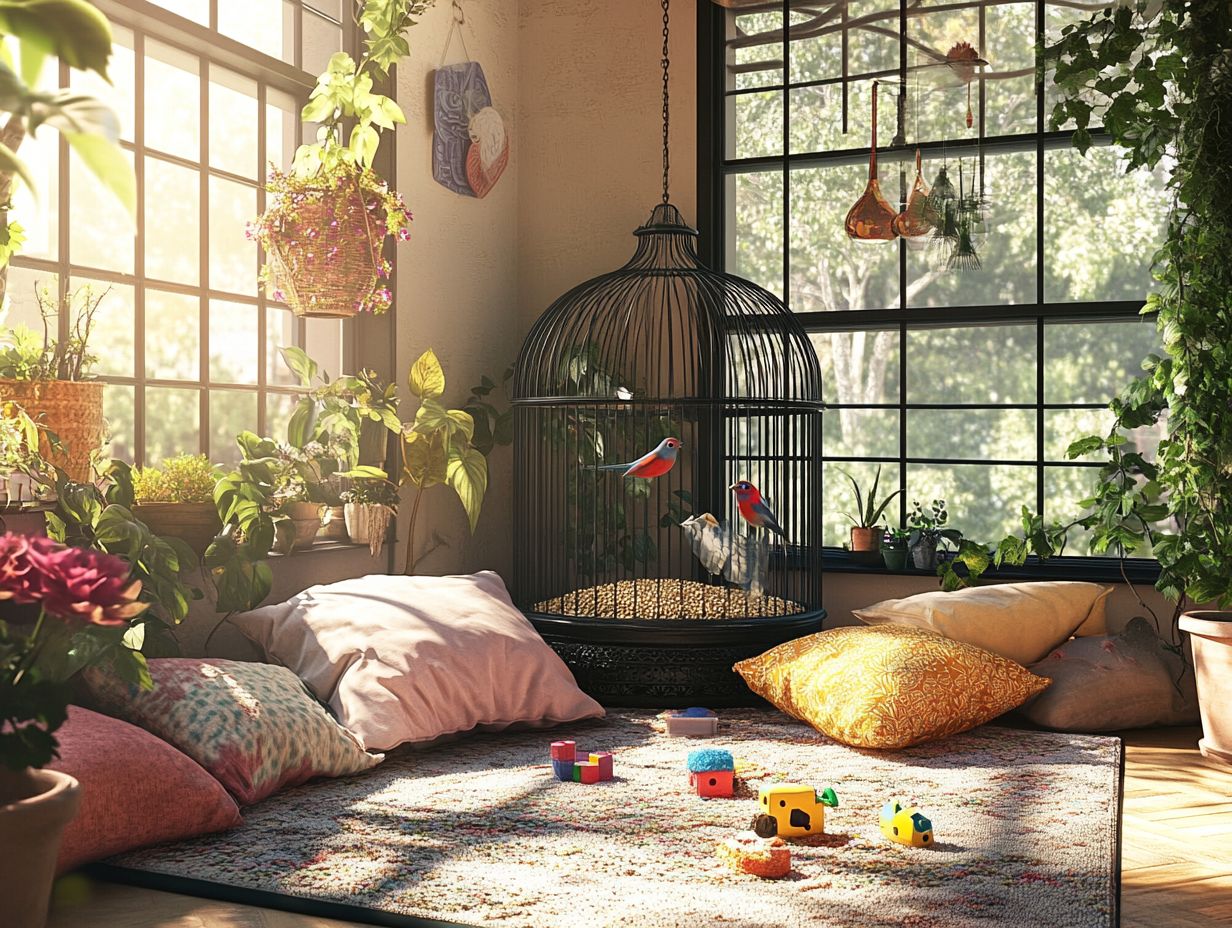
Building trust with your bird is gradual. A consistent routine helps create a sense of security.
Introduce routines around feeding and playtime. Your bird will begin to associate these moments with safety and affection.
Understanding your bird s unique preferences will enhance trust further. Predictable habits help your bird feel grounded.
Familiarity with interactions reduces anxiety. When your bird can anticipate routines, it engages more openly.
Transform training sessions into enjoyable experiences. This reinforces the idea that collaboration leads to positive outcomes.
Potential Challenges and Solutions
Owning a bird can be rewarding, but challenges may arise. You might see behavioral issues like excessive noise or biting.
Recognizing these behaviors is vital. Investigate their root causes to develop effective training solutions.
Addressing challenges early sets the stage for a better ownership experience.
Addressing Common Behavioral Issues
Addressing common behavioral issues in birds is essential for a harmonious home. Your feathered friends may scream, bite, or pluck feathers due to stress, boredom, or lack of social interaction.
To manage these behaviors, identify their causes and apply specific training methods. Set clear rules, provide engaging toys, and ensure regular social interaction to significantly improve your bird’s demeanor and strengthen the bond of trust between you and your pet.
Understanding the unique needs of each bird can further enhance their well-being. A lack of mental stimulation often leads to destructive behaviors; thus, incorporating a variety of toys that make them think can keep them entertained and engaged.
Creating a consistent routine not only helps reduce anxiety but also fosters a sense of security for your avian friend. Offering positive reinforcement during training sessions can cultivate a more cooperative and confident bird.
Scheduling regular vet check-ups is important to rule out any health issues that may contribute to behavioral problems, ensuring your pet remains happy and healthy.
Frequently Asked Questions
What are the basic steps to prepare my home for a new bird?
The basic steps to prepare your home for a new bird include choosing the right cage, setting up a designated area, ensuring safety, and following how to prepare for bird adoption day by providing necessary items for the bird’s well-being.
What type of cage should I get for my new bird?
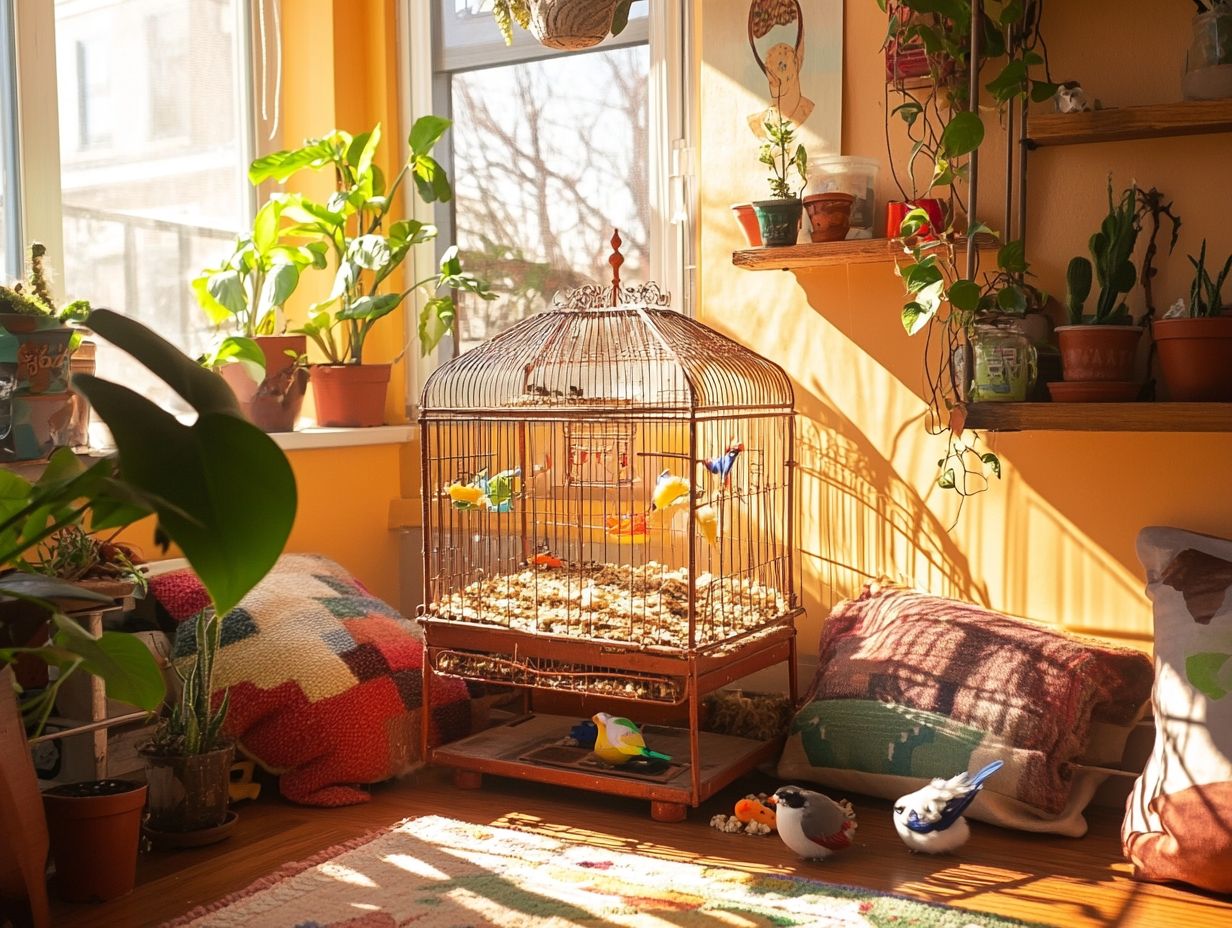
The cage should be appropriate for the size and type of bird you are getting. It should be spacious enough for the bird to move around, with bars that are close enough together to prevent escape. It should also have a secure door and be easy to clean.
Why is it important to have a designated area for my new bird?
Having a designated area for your new bird helps it adjust to its new home and prevents it from getting overwhelmed. It also gives the bird a sense of security and helps with its daily routine.
How can I ensure my home is safe for my new bird?
You can ensure safety for your new bird by covering any exposed wires, removing potential hazards like toxic plants or small objects that can be swallowed, and closing off any areas where the bird could get stuck or injured. Additionally, it’s important to learn how to set up a training area for your bird to create a safe and comfortable environment.
What items should I provide for my new bird’s well-being?
Aside from a cage, your new bird will need perches, food and water dishes, toys, and a bird bath. It’s also important to have a supply of appropriate food and treats for your bird’s specific diet.
Do I need to make any changes to my home for a new bird?
Yes, you may need to make some changes to your home to ensure the safety and well-being of your new bird. This can include moving any potential hazards or rearranging furniture to create a designated area for the bird. For detailed guidance, consider these tips for bird-proofing your home.
Ready to welcome your new bird? Let’s get prepared!

